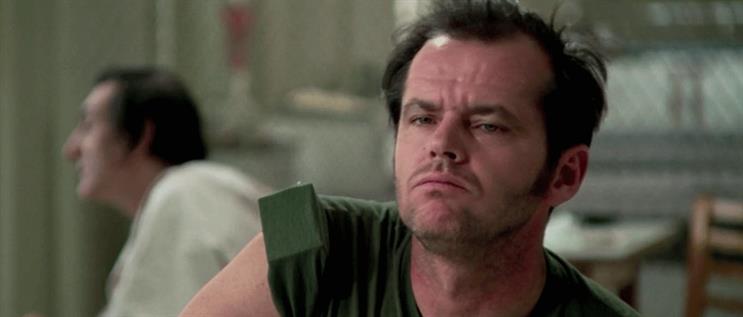I was having dinner at a friend’s house the other day. First bottle of wine: how’s work? Second bottle of wine: where are you holidaying this year? Third bottle: REFERENDUM.
As I’m sure many of us have done, we ended up looking online at the pros and cons of Europe. One site we came across was very honest and simply said: "I don’t know." I don’t know.
Settling into that warm fuzzy red wine haze, I was struck by how wonderfully releasing and underused that expression is. I. Don’t. Know.
It basically says nothing is set in stone, nothing is predetermined, everything coming up is an experiment. This is where the creative spirit really thrives – the pioneer, the Robinson Crusoe.
Who doesn’t have a shelter, so he builds one. Doesn’t have a spear, so he makes one. Doesn’t even have clothes, so he makes them. He doesn’t know a thing. Everything is an experiment.
Now, I’m not talking about the referendum here – fuck, no! Beardy creatives with a penchant for elaborate doodles and deeply contradictive politics do not mix. No, siree! I’m talking about the celebration of not knowing what’s just around the corner.
We all work in an industry where we now somehow have "experts" in everything. Everything. Specialists in the most minute, random corners of marketing, behind the sofa covered in fluff. You didn’t even know it was a thing until it was researched, given a ludicrously overcomplicated title and suddenly there’s a specialist in it. In your agency.
He sits near the planning department. But not actually in planning. Now, I love a good specialist. I’m a strong believer in hiring the right talent for the job. But I also love an open mind.
That childlike excitement at the notion that they are about to find something out and discover something new. There is magic in not knowing, that gentle shaking of the wrapped present. "I don’t know" leads to questions and imagination, to coming up with things and stuff.
Questions are what make good scientists. The more you ask, the more you push and the further you go. Be a specialist, but keep asking questions. For all creatives, "I don’t know" should be a motto, a belief that because it isn’t written down, or a thing, then you get to create it. It’s absolute freedom. A blank piece of paper sits in front of you. "Whatcha drawin’?" "I don’t know."
Don’t treat it as a panicked plea of despair, but a primordial cry across the swamps into the leaden sky as evolution happens… live. In your agency. Saying "I don’t know" with pride is enormously fulfilling. Say it proudly and watch how much it unnerves the person questioning you. Say it with confidence and enough abandon and watch their fear set in – you’re suddenly Jack Nicholson in One Flew Over the Cuckoo’s Nest, you’re Jack Nicholson in Easy Rider, baby! You’re Jack Nicholson in The Shining! Wait, no, not The Shining. Chinatown.
For all creatives, "I don’t know" should be a motto, a belief that because it isn’t written down, or a thing, then you get to create it. It’s absolute freedom.
You’re a renegade, you’re dangerous but you’re the best! Saying "I don’t know" is how experiments happen. What happens if you put this with this? "I don’t know." The alchemist in his proto lab, mixing base metals together. He then became a scientist with a degree and everything.
Now it’s called hacking, and there are experts in that too. I call it being creative and saying "I don’t know" enough times that you create something new. Don’t have an answer for every single thing – leave some gaps. If you have an answer for everything, you breed a culture afraid to experiment.
Without experimentation, there’s no innovation or risk and, most importantly, no magic. "I don’t know" said by a true optimist (the creative mind – to be clear: anyone can have a creative mind) is a glorious thing; said by a pessimist (the noncreative mind) and it’s a lonely hangover in a house with broken windows and no heating. The key difference being that a creative mind sees the wideopen expanses of not knowing as a place to build ideas, interlinking thoughts and narratives.
It’s a totally blank canvas, fresh snow on the lawn at 7am. The non-creative mind sees "I don’t know" as being abandoned on an unforgiving, unpopulated planet light years from home. You see, the pessimist has no way of building a shimmering, soaring city of glorious sun-bathed beauty. They can’t see it, so they can’t build it. Panic ensues. And panic is infectious.
When the noncreative mind infects a group with doubt, the best way to steady them is with the addition of one small word: yet. "I don’t know – yet." To the pessimist, "I don’t know" reeks of inertia – once you don’t know, you never will. But isn’t half the fun of not knowing the learning and inventing in equal measure
Filling that void of lack of knowledge? It’s like running a bath, and good ideas are the bubbles – lots and lots of bubbles. I’m not saying don’t have an opinion, though. Always have an opinion. Crusoe had an opinion on where he wanted his shelter.
Have an opinion but embrace not knowing. Not knowing is freedom. Not knowing means anything is possible in the future. Not knowing creative restraints means there are no restraints. Trust me, I don’t know. Yet.
Ross Neil is executive creative director at WCRS


